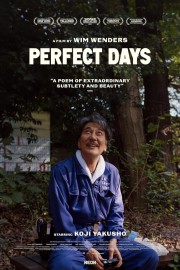Perfect Days
Even in his worst films, you can count on Wim Wenders to deliver a great soundtrack. (I’m looking at you, “The Million Dollar Hotel.”) In his best films, that greatness becomes euphoric as we watch (and listen) to how the music helps tells the story, set mood, or define character. In “Perfect Days,” we learn a lot about Kôji Yakusho’s character, Hirayama, just by listening to the songs that come on when he’s driving. But can we infer a lot from his listening to “The House of the Rising Sun,” “Redondo Beach,” “Sunny Afternoon” or “Brown Eyed Girl?” Their meaning is only for him to know, but the fact that he’s listening to them on cassette says plenty. It shows that he’s put in the care it takes to take care of both the player and the cassettes, and it shows that he’s more interested in things that are comfortable routine rather than drastic changes.
Four months ago, I started a new job, as I’ve written about before on here. While there was comfort in the routine of that job, the stability was starting to get shaky, and I had wanted to move on for a while. In my new job, I’m very much like Hirayama, driving to the places I go for work, doing my work in solitary, and moving on to the next job. There’s a ritual to the drive, and a sense of serenity that comes with working on your own. Certainly I miss the camaraderie of my old life, but I’ve always felt more comfortable by myself, doing what needs to be done to get the job done right. With that perspective, I adored “Perfect Days,” which celebrates the need for a routine, and the joy of a solitary work schedule.
In a way, the screenplay by Wenders and Takuma Takasaki feels like a riff on Kurosawa’s “Ikiru,” but not in the same way “Living” did a few years ago. Here, we’re seeing someone who gets satisfaction from his job, even if it’s not a glamorous one, and sees it as something that should be done with pride. His coworker, Takashi (Tokio Emoto), sees it simply as a way of making money, but that’s hard to do when he’s late or when he’s taking off to try and score with a girl (Aoi Yamada). Seeing he and Hirayama together is like watching water and vinegar; they don’t mix. One day, Takashi’s moped doesn’t start, so Hirayama must take he and his girl around town. When Hirayama puts on some Patty Smith, the girl loves listening to the song, but when they stop at a used record store, Takashi is just interested in how much Hirayama could make if he sold his tapes…so he can afford to take his girl out. He doesn’t understand what they mean to Hirayama, because he doesn’t appreciate the sense of a strong routine. One hopes that in the future, he will.
The disruptions to Hirayama’s routine do not really disrupt his sense of work ethic; we get the sense he’s been doing this long enough to where it would take a lot to shake up his routine. His niece, Niko (Arisa Nakano), coming for a surprise visit does to an extent, but even when his sister comes to collect her, and we find out what is going on with their father, it’s a distraction, but it doesn’t distract from his life, even when his sister doesn’t respect his career choice. He doesn’t judge her judgement of him, but we can; sometimes it’s not easy for people to appreciate the opportunities a decision we’ve made have given us until they see the rewards of it. I remember how my parents looked at my long tenure at Regal as a detriment, as a sense of laziness on my part, until they saw the sense of community I had with my coworkers after I was hospitalized in 2007; they never questioned it afterwards. I relate so much with Hirayama in this film.
Wenders’s direction in this is as simple and straightforward as his work in “Wings of Desire,” but I also couldn’t help but think of his sprawling epic, “Until the End of the World,” as well. A big part of that is the soundtrack, but one of the things that floored me about that film was how he took the simplicity of life, broke it down, and reveled in the journey the characters were taking. Hirayama is not going great distances across the world in “Perfect Days,” but his view of the world is vast. We see him watching people in bars, from park benches, and appreciating the simple beauty of the sun peering through the leaves of a tree. For most of us, perfect days feel like a rare occasion; for Hirayama, it seems like he has them on a regular basis. It’s all about how we view the world, and our place in it. If there’s one lesson to be gained from “Perfect Days,” it’s to figure out what a perfect day means for us, and try to live it every day.










